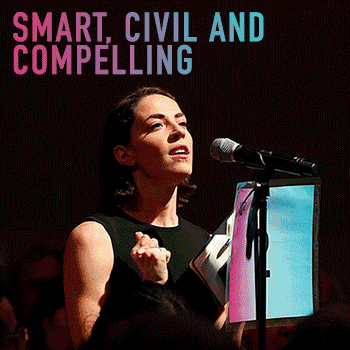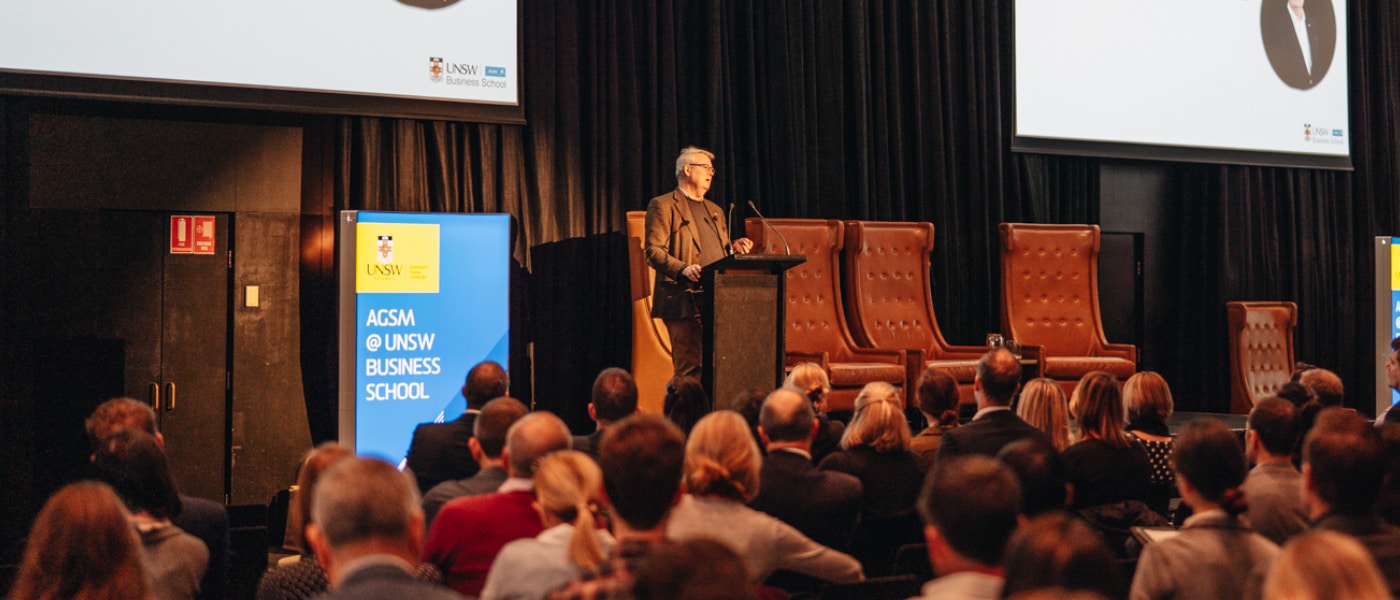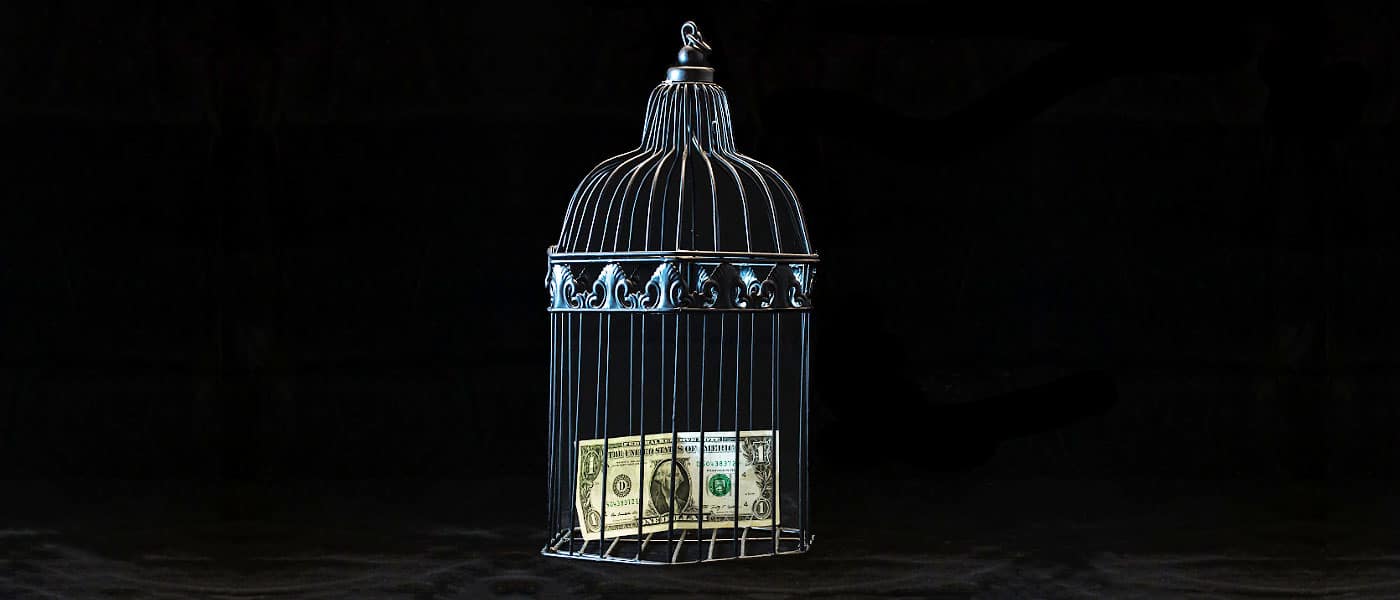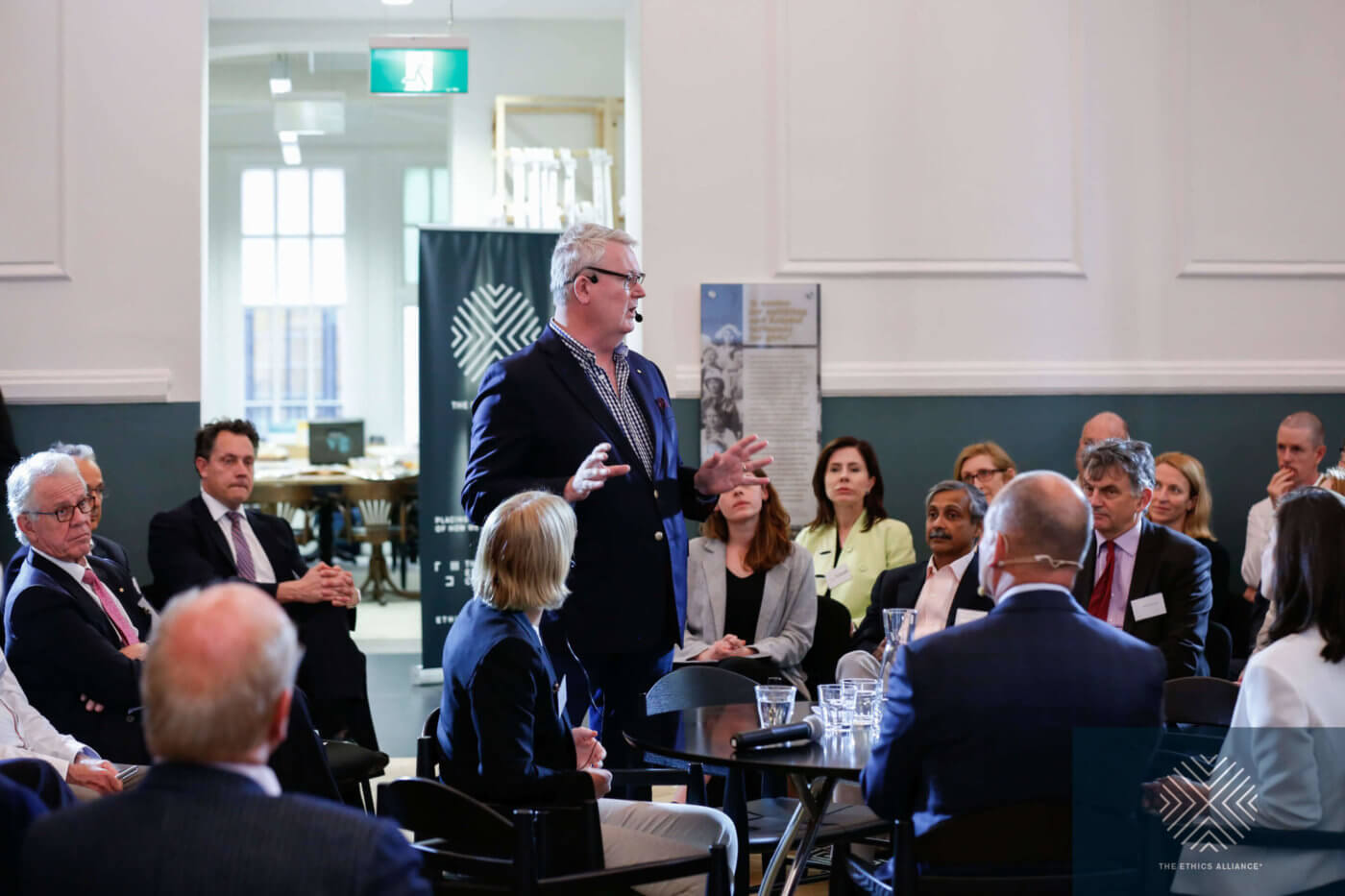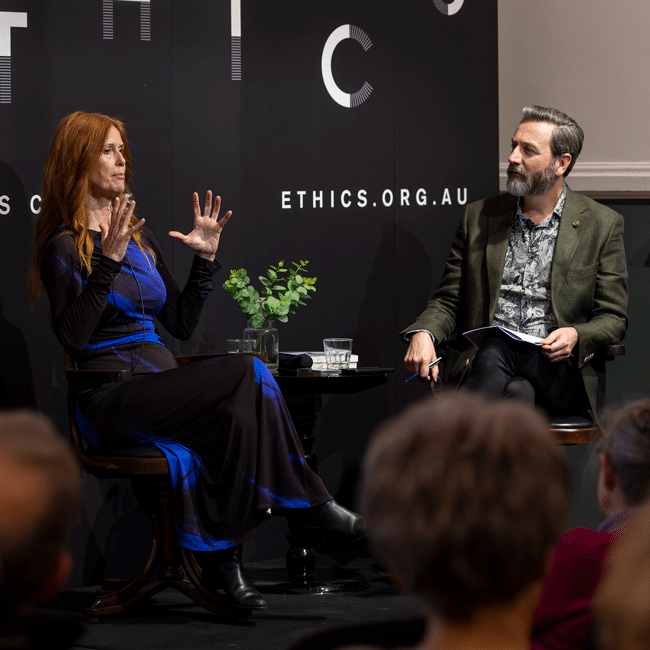Not too late: regaining control of your data

Not too late: regaining control of your data
Opinion + AnalysisBusiness + LeadershipPolitics + Human RightsScience + Technology
BY The Ethics Centre 15 MAR 2019
IT entrepreneur Joanne Cooper wants consumers to be able to decide who holds – and uses – their data. This is why Alexa and Siri are not welcome in her home.
Joanne won’t go to bed with her mobile phone on the bedside table. It is not that she is worried about sleep disturbances – she is more concerned about the potential of hackers to use it as a listening device.
“Because I would be horrified if people heard how loud I snore,” she says.
She is only half-joking. As an entrepreneur in the field of data privacy, she has heard enough horror stories about the hijacking of devices to make her wary of things that most of us now take for granted.
“If my device, just because it happened to be plugged in my room, became a listening device, or a filming device, would that put me in a compromising position? Could I have a ransomware attack?”
(It can happen and has happened. Spyware and Stalkerware are openly advertised for sale.)
Taking back control
Cooper is the founder of ID Exchange – an Australian start-up aiming to allow users to control if, when and to whom they will share their data. The idea is to simplify the process so that people will be able to visit one platform to control access.
This is important because, at present, it is impossible to keep track of who has your data and how much access you have agreed to and whether you have allowed it to be used by third parties. If you decide to revoke that access, the process is difficult and time-consuming.
Big data is big business
The data that belongs to you is liquid gold for businesses wanting to improve their offerings and pinpoint potential customers. It is also vital information for government agencies and a cash pot for hackers.
Apart from the basic name, address, age details, that data can reveal the people to whom you are connected, your finances, health, personality, preferences and where you are located at any point in time.
That information is harvested from everyday interactions with social media, service providers and retailers. For instance, every time you answer a free quiz on Facebook, you are providing someone with data.
Google Assistant uses your data to book appointments
With digital identity and personal data-related services expected to be worth $1.58 trillion in the EU alone by 2020, Cooper asks whether we have consciously given permission for that data to be shared and used.
A lack of understanding
Do we realise what we have done when we tick a permission box among screens of densely-worded legalese? When we sign up to a loyalty program?
A study by the Consumer Policy Research Centre finds that 94 per cent of those surveyed did not read privacy policies. Of those that did, two-thirds said they still signed up despite feeling uncomfortable and, of those, 73 per cent said they would not otherwise have been able to access the service.
And, what we are getting in return for that data? Do we really want advertisers to know our weak points, such as when we are in a low mood and susceptible to “retail therapy”? Do we want them to conclude we are expecting a new baby before we have had a chance to announce it to our own families?
Even without criminal intent, limited control over the use of our data can have life-altering consequences when it is used against us in deciding whether we may qualify for insurance, a loan, or a job.
“It is not my intention to create fear or doubt or uncertainty about the future,” explains Cooper. “My passion is to drive education about how we have to become “self-accountable” about the access to our data that will drive a trillion-dollar market,” she says.
“Privacy is a Human Right.”
Cooper was schooled in technology and entrepreneurialism by her father, Tom Cooper, who was one of the Australian IT industry’s pioneers. In the 1980s, he introduced the first IBM Compatible DOS-based computers into this country.
She started working in her father’s company at the age of 15 and has spent the past three decades in a variety of IT sectors, including the PC market, consulting for The Yankee Group, as a cloud specialist for Optus Australia, and financial services with Allianz Australia.
Starting ID Exchange in 2015, Cooper partnered with UK-based platform Digi.me, which aims to round up all the information that companies have collected on individuals, then hand it over those individuals for safekeeping on a cloud storage service of their choosing. Cooper is planning to add in her own business, which would provide the technology to allow people to opt in and opt out of sharing their data easily.
Cooper says she became passionate about the issue of data privacy in 2015, after watching a 60 Minutes television segment about hackers using mobile phones to bug, track and hack people through a “security hole” in the SS7 signaling system.
This “hole” was most recently used to drain bank accounts at Metro Bank in the UK, it was revealed in February.
Lawmakers aim to strengthen data protection
The new European General Data Protection Regulation is a step forward in regaining control of the use of data. Any Australian business that collects data on a person in the EU or has a presence in Europe must comply with the legislation that ensures customers can refuse to give away non-essential information.
If that company then refuses service, it can be fined up to 4 per cent of its global revenue. Companies are required to get clear consent to collect personal data, allows individuals to access the data stored about them, fix it if it is wrong, and have it deleted if they want.
The advance of the “internet of things” means that everyday objects are being computerised and are capable of collecting and transmitting data about us and how we use them. A robotic vacuum cleaner can, for instance, record the dimensions of your home. Smart lighting can take note of when you are home. Your car knows exactly where you have gone.
For this reason, Cooper says she will not have voice-activated assistants – such as Google’s Home, Amazon Echo’s Alexa or Facebook’s Portal – in her home. “It has crossed over the creepy line,” she says.
“All that data can be used in machine learning. They know what time you are in the house, what room you are in, how many people are in the conversation, keywords.”
Your data can be compromised
Speculation that Alexa is spying on us by storing our private conversations has been dismissed by fact-checking website Politifact, although researchers have found the device can be hacked.
The devices are “always-on” to listen for an activating keyword, but the ambient noise is recorded one second at a time, with each second dumped and replaced until it hears a keyword like “Alexa”.
However, direct commands to those two assistants are recorded and stored on company servers. That data, which can be reviewed and deleted by users, is used to a different extent by the manufacturers.
Google uses the data to build out your profile, which helps advertisers target you. Amazon keeps the data to itself but may use that to sell you products and services through its own businesses. For instance, the company has been granted a patent to recommend cough sweets and soup to those who cough or sniff while speaking to their Echo.
In discussions about rising concerns about the use and misuse of our data, Cooper says she is frustrated by those who tell her that “privacy is dead” or “the horse has bolted”. She says it is not too late to regain control of our data.
“It is hard to fix, it is complex, it is a u-turn in some areas, but that doesn’t mean that you don’t do it.”
It was not that long ago that publicly disagreeing with your employer’s business strategy or staging a protest without the protection of a union, would have been a sackable offence.
But not today – if you are among the business “elite”.
Last year, 4,000 Google employees signed a letter of protest about an artificial intelligence project with the Department of Defense. Google agreed not to renew the contract. No-one was fired.
Also at Google, employees won concessions after 20,000 of them walked out protesting the company’s handling of sexual harassment cases. Everyone kept their jobs.
Consulting firms Deloitte and McKinsey & Company and Microsoft have come under pressure from employees to end their work with the US Department of Immigration and Customs Enforcement (ICE), because of concerns about the separation of children from their illegal immigrant parents.
Amazon workers demanded the company stop selling its Rekognition facial recognition software to law enforcement.
Examples like these show that collective action at work can still take place, despite the decline of unionism, if the employees are considered valuable enough and the employer cares about its social standing.
The power shift
Charles Wookey, CEO of not-for-profit organisation A Blueprint for Better Business says workers in these kinds of protests have “significant agency”.
“Coders and other technology specialists can demand high pay and have some power, as they hold skills in which the demand far outstrips the supply,” he told CEO Magazine.
Individual protesters and whistle-blowers, however, do not enjoy the same freedom to protest. Without a mass of colleagues behind them, they can face legal sanction or be fired for violating the company’s code of conduct – as was Google engineer James Damore when he wrote a memo criticising the company’s affirmative action policies in 2017.
Head of Society and Innovation at the World Economic Forum, Nicholas Davis, says technology has enabled employees to organise via message boards and email.
“These factors have empowered employee activism, organisation and, indeed, massive walkouts –not just around tech, by the way, but around gender and about rights and values in other areas,” he said at a forum for The Ethics Alliance in March.
Change coming from within
Davis, a former lawyer from Sydney, now based in Geneva, says even companies with stellar reputations in human rights, such as Salesforce, can face protests from within – in this case, also due to its work with ICE.
“There were protesters at [Salesforce annual conference] Dreamforce saying: ‘Guys, you’re providing your technology to customs and border control to separate kids from their parents?,” he said.
Staff engagement and transparency
Salesforce responded by creating Silicon Valley’s first-ever Office of Ethical and Humane Use of Technology as a vehicle to engage employees and stakeholders.
“I think the most important thing is to treat it as an opportunity for employee engagement,” says Davis, adding that listening to employee concerns is a large part of dealing with these clashes.
“Ninety per cent of the problem was not [what they were doing] so much as the lack of response to employee concerns,” he says. Employers should talk about why the company is doing the work in question and respond promptly.
“After 72 hours, people think you are not taking this seriously and they say ‘I can get another job, you know’, start tweeting, contact someone in the ABC, the story is out and then suddenly there is a different crisis conversation.”
Davis says it is difficult to have a conversation about corporate social activism in Australia, where business leaders say they are getting resistance from shareholders.
“There’s a lot more space to talk about, debate, and being politically engaged as a management and leadership team on these issues. And there is a wider variety of ability to invest and partner on these topics than I perceive in Australia,” says Davis, who is also an adjunct professor with Swinburne University’s Institute for Social Innovation.
“It’s not an issue of courage. I think it’s an issue with openness and demand and shifting culture in those markets. This is a hard conversation to have in Australia. It seems more structurally difficult,” he says.
“From where I stand, Australia has far greater fractures in terms of the distance between the public, private and civil society sectors than any other country I work in regularly. The levels of distrust here in this country are far higher than average globally, which makes for huge challenges if we are to have productive conversations across sectors.”
MOST POPULAR
EssayBUSINESS + LEADERSHIP
An ethical dilemma for accountants
ArticleBUSINESS + LEADERSHIP
Ethics in engineering makes good foundations
EssayBUSINESS + LEADERSHIP
Has passivity contributed to the rise of corrupt lawyers?
BY The Ethics Centre
The Ethics Centre is a not-for-profit organisation developing innovative programs, services and experiences, designed to bring ethics to the centre of professional and personal life.
Employee activism is forcing business to adapt quickly

Employee activism is forcing business to adapt quickly
Opinion + AnalysisBusiness + LeadershipRelationships
BY The Ethics Centre 12 MAR 2019
It was not that long ago that publicly disagreeing with your employer’s business strategy or staging a protest without the protection of a union, would have been a sackable offence.
But not today – if you are among the business “elite”.
Last year, 4,000 Google employees signed a letter of protest about an artificial intelligence project with the Department of Defense. Google agreed not to renew the contract. No-one was fired.
Also at Google, employees won concessions after 20,000 of them walked out protesting the company’s handling of sexual harassment cases. Everyone kept their jobs.
Consulting firms Deloitte and McKinsey & Company and Microsoft have come under pressure from employees to end their work with the US Department of Immigration and Customs Enforcement (ICE), because of concerns about the separation of children from their illegal immigrant parents.
Amazon workers demanded the company stop selling its Rekognition facial recognition software to law enforcement.
Examples like these show that collective action at work can still take place, despite the decline of unionism, if the employees are considered valuable enough and the employer cares about its social standing.
The power shift
Charles Wookey, CEO of not-for-profit organisation A Blueprint for Better Business says workers in these kinds of protests have “significant agency”.
“Coders and other technology specialists can demand high pay and have some power, as they hold skills in which the demand far outstrips the supply,” he told CEO Magazine.
Individual protesters and whistle-blowers, however, do not enjoy the same freedom to protest. Without a mass of colleagues behind them, they can face legal sanction or be fired for violating the company’s code of conduct – as was Google engineer James Damore when he wrote a memo criticising the company’s affirmative action policies in 2017.
Head of Society and Innovation at the World Economic Forum, Nicholas Davis, says technology has enabled employees to organise via message boards and email.
“These factors have empowered employee activism, organisation and, indeed, massive walkouts –not just around tech, by the way, but around gender and about rights and values in other areas,” he said at a forum for The Ethics Alliance in March.
Change coming from within
Davis, a former lawyer from Sydney, now based in Geneva, says even companies with stellar reputations in human rights, such as Salesforce, can face protests from within – in this case, also due to its work with ICE.
“There were protesters at [Salesforce annual conference] Dreamforce saying: ‘Guys, you’re providing your technology to customs and border control to separate kids from their parents?,” he said.
Staff engagement and transparency
Salesforce responded by creating Silicon Valley’s first-ever Office of Ethical and Humane Use of Technology as a vehicle to engage employees and stakeholders.
“I think the most important thing is to treat it as an opportunity for employee engagement,” says Davis, adding that listening to employee concerns is a large part of dealing with these clashes.
“Ninety per cent of the problem was not [what they were doing] so much as the lack of response to employee concerns,” he says. Employers should talk about why the company is doing the work in question and respond promptly.
“After 72 hours, people think you are not taking this seriously and they say ‘I can get another job, you know’, start tweeting, contact someone in the ABC, the story is out and then suddenly there is a different crisis conversation.”
Davis says it is difficult to have a conversation about corporate social activism in Australia, where business leaders say they are getting resistance from shareholders.
“There’s a lot more space to talk about, debate, and being politically engaged as a management and leadership team on these issues. And there is a wider variety of ability to invest and partner on these topics than I perceive in Australia,” says Davis, who is also an adjunct professor with Swinburne University’s Institute for Social Innovation.
“It’s not an issue of courage. I think it’s an issue with openness and demand and shifting culture in those markets. This is a hard conversation to have in Australia. It seems more structurally difficult,” he says.
“From where I stand, Australia has far greater fractures in terms of the distance between the public, private and civil society sectors than any other country I work in regularly. The levels of distrust here in this country are far higher than average globally, which makes for huge challenges if we are to have productive conversations across sectors.”
This article was originally written for The Ethics Alliance. Find out more about this corporate membership program. Already a member? Log in to the membership portal for more content and tools here.
MOST POPULAR
EssayBUSINESS + LEADERSHIP
An ethical dilemma for accountants
ArticleBUSINESS + LEADERSHIP
Ethics in engineering makes good foundations
EssayBUSINESS + LEADERSHIP
Has passivity contributed to the rise of corrupt lawyers?
BY The Ethics Centre
The Ethics Centre is a not-for-profit organisation developing innovative programs, services and experiences, designed to bring ethics to the centre of professional and personal life.
The Ethics Centre: A look back on the highlights of 2018

The Ethics Centre: A look back on the highlights of 2018
Opinion + AnalysisBusiness + LeadershipSociety + Culture
BY The Ethics Centre 18 DEC 2018
Sometimes, good people do bad things. The last year confirmed this. Banks, schools, universities, the military, religious institutions – it seems 2018 left no sector unshaken.
These are the sorts of issues we confront every day at The Ethics Centre. In our reviews and confidential advice we have seen similar patterns repeat over and over again.
Yes, bad apples may exist, but we find ethical issues arise from bad cultures. And even our most trusted institutions, perhaps unwittingly, foster bad behaviour.
That’s why we have an important job. With your support we help society understand why ethical failures happen and provide safeguards lest they repeat.
As The Ethics Centre approaches its 30th birthday, we’d love to say we’re no longer needed. We hoped to bring ethics to the centre of everyday life and think we’ve made a small dent into that task. But there’s no point pretending there’s not a long way to go.
We thank you for supporting us and believing in us and are proud to share the highlights of another busy year with you.
If you’re short on time to read the full report now (and we’d really love you to take a look some time at what a small organisation like ours can achieve), here are seven highlights we’re particularly proud of:
• We launched The Ethics Alliance. A community of organisations unified by the desire to lead, inspire and shape the future of how we do business. In one year, 37 companies have benefited from the innovative tools that help staff at all levels make better decisions.
• We published a paper on public trust and the legitimacy of our institutions. Our conversations with regulators, investors, business leaders and community groups, revealed a sharp decline in the trust of our major institutions. We identify the agenda they need to in order to maintain public trust and contribute meaningfully to the common good.
• We ramped up Ethi-call. Calls to our free, independent, national helpline increased by 74 per cent this year. That’s even more people to benefit from impartial, private guidance from our highly trained ethical counsellors.
• We reviewed the culture of Australian cricket. When the ball-tampering scandal hit the world stage, Cricket Australia asked us to investigate. We uncovered a culture of ambition, arrogance, and control, where “winning at all costs” indicted administrators and players alike.
•We released a guide to designing ethical tech. Technology is transforming the way we experience reality. The need to make sure we don’t sacrifice ethics for growth is more pressing than ever. We propose eight principles to guide the development of all new technologies before they hit the market. You can download it here.
•We redesigned the Festival of Dangerous Ideas. FODI was created to facilitate courageous public conversation. The Ethics Centre and UNSW’s Centre for Ideas collaborated to untether the festival and produce a bold and necessary world-class cultural event. Every session sold out.
• We grew our tenth year of IQ2. We doubled the number of live attendees and tripled the student base showing audiences are more intelligent and hungry for diverse ideas than they are often given credit for. We welcomed a new sponsor Australian Ethical whose values align with our own. There’s never been a better time to support smart, civic, public debate.
Ethics in your inbox.
Get the latest inspiration, intelligence, events & more.
By signing up you agree to our privacy policy
You might be interested in…
Opinion + Analysis
Business + Leadership
Ethics of making money from JobKeeper
Opinion + Analysis
Relationships, Society + Culture
Bring back the anti-hero: The strange case of depiction and endorsement
Opinion + Analysis
Relationships, Science + Technology, Society + Culture
5 things we learnt from The Festival of Dangerous Ideas 2022
Big thinker
Politics + Human Rights, Society + Culture
Big Thinker: Slavoj Žižek
BY The Ethics Centre
The Ethics Centre is a not-for-profit organisation developing innovative programs, services and experiences, designed to bring ethics to the centre of professional and personal life.
Perils of an unforgiving workplace
s

Perils of an unforgiving workplace
Opinion + AnalysisBusiness + Leadership
BY The Ethics Centre ethics 30 NOV 2018
Public relations executive, Justine Sacco, thought she might get a few laughs when she tweeted what she thought was a poor-taste joke to her 170 followers. Instead, she was sacked from her job and found herself in the centre of a social media shaming frenzy.
Sent as she embarked on a flight, the tweet posted by Sacco in 2014 read: “Going to Africa. Hope I don’t get AIDS. Just kidding. I’m white!”.
This is the nature of the internet, where a crass and thoughtless “joke” is likely to taint Sacco’s whenever anyone types it into a search engine.
But while the internet may not forget, her employer has already forgiven her. US-based internet and media company IAC, rehired her after she spent a few years working elsewhere.
IAC CEO, Joey Levin, welcomed her back. “With one notable exception, Justine’s track record speaks for itself,” he wrote in a statement.
Business leaders are often encouraged to be tolerant of human frailties. Influential Harvard Business School professor, Rosabeth Moss Kanter, has written:
“Leaders must be firm and foster accountability, but they also must know when to forgive past wrongs in the service of building a brighter future”.
What about hiring a former criminal?
Humans are fallible. We do dumb stuff, we can take leave of our senses in times of stress, we let our emotions get the better of us and we make bad choices.
However, while employers may be prepared to forgive thoughtless actions made with “a sudden rush of blood to the head”, a criminal’s past may be something altogether different.
A substantial segment of the population will have some sort of criminal record, ranging from minor traffic and drug offences to serious jail time. Statistics from the UK, Canada and the US indicate around 20 to 25 per cent of their male populations and up to six per cent of women have a criminal record. Australia is assumed to be similar.
If employers insist that all their employees must have a “clean slate”, a lot of people will be left on the employment scrap heap. This discrimination is illegal anyway, unless said conviction prevents them from performing the inherent requirements of the job.
One person working to get former offenders back into the workforce is Rabbi Dr Dovid Slavin, CEO of Our Big Kitchen – a Bondi-based charity that trains and employs prisoners and former offenders. Last year, they distributed more than 80,000 meals to disadvantaged people.
Rabbi Slavin says work release programs are only available to around 1.5 per cent of inmates, who are in the final year of their sentence.
Once they are looking for employment, former inmates will have a more successful relationship with an employer if they are open about their criminal past, he says.
“The most important thing that I found is where an inmate is able to freely talk about what he or she did and they’ve come to terms with it,” he says.
“If they feel hard done by the system, rightly or wrongly, it can be very difficult for them to integrate and move forward because they carrying baggage from the past.”
If they are coming in a work-release program, they must be willing to have their bags checked, for instance. “They can’t be overly-precious about how they are treated,” he says.
“We here [at Our Big Kitchen] always treated them like family, treated them with a great deal of respect and comfort and that made them want to be extremely co-operative and extremely forthcoming.”
Two reasons to offer a second chance
The CEO of employment assistance organisation Joblink Plus, Christine Shewry, says employers have two compelling reasons to give former prisoners a second chance.
Firstly, people with troublesome backgrounds can make outstanding employees if they get the right support and training, says Shewry, whose service helps people who face barriers in the employment market in regional NSW.
“Those people who have not had the best start in life, who have had a challenge, can become amazing employees because of the discretionary effort they will put in when you give them a go.”
As a second motivation, offering redemption can have transformative effects on society.
In Glasgow, once regarded as the “murder capital” of Europe, non-sexual crimes of violence have fallen by 44 per cent over ten years – a feat credited to a police-initiated program to get offenders off the streets and into training and work.
Scotland’s police force adopted a public health approach, co-operating with the education system and health service to tackle the root causes of crime.
According to researchers Eileen Baldry and Sophie Russell at UNSW, the majority of prisoners in Australia have severely disadvantaged backgrounds, with serious health, mental health and disability concerns.
They say 60 per cent of inmates are not functionally literate or numerate, 64 per cent have no stable family, and 60 per cent of males and 70 per cent of females have a history of illicit drug use.
Shewry points to the effectiveness of back-to-work programs in turning people’s lives around. She says Joblink Plus has run programs for ex-offenders where 70 per cent have never reoffended, while national recidivism rates are at 44.8 per cent (the percentage of prisoners released during 2014-15 who returned to prison within two years
Rabbi Slavin says out of more than 40 former inmates employed through his program, none have returned to jail.
“If we, as a society, continue to shun anybody who has a criminal past, then we are really sentencing ourselves to that person having to re-offend because of the way he or she will be able to support themselves emotionally and physically and financially, he says.
“When somebody comes out of out of incarceration, very often their families have abandoned them, very often they’ve abandoned themselves. They don’t believe in themselves anymore.”
They have to adjust to a world where a correctional officer no longer dictates their every move. It could take 20 minutes for them to choose between soft drink brands because they are unused to making decisions, he says.
Managing the risk
Former CEO of logistics group, Toll Holdings, Paul Little, has been a strong supporter of helping former inmates into work. Under his stewardship, Toll ran a program, Second Step, which has helped more than 500 people to move from drug addiction and jail into permanent employment.
Little told The Australian newspaper that he regretted being unable to convince other ASX 200 companies to introduce a similar scheme. (Neither Little of Toll Holdings would comment for this article).
“It is a massive disappointment. People aren’t willing in business life, in corporate life, even in government, to try to manage that risk. We saw an opportunity for people to become amazing employees, and invariably they did.”
Shewry says some people, who are assessed by the government as ready to work, will have to be closely supervised if their criminal history dictates that. Those jobs may be in manufacturing, labouring, food processing, or rural work.
Emily Roy, Joblink Plus’ executive manager for community partnerships says is not a simple matter to place former offenders in work. “One of the big supports that we can offer employers is to not pretend that everything is going to be fabulous all the time,” she says.
“There are a lot of practicalities when working with someone who, for example, has a history of child-related offences. But we do work with them and there are employers who are able to do that because there is work that needs to be done. So, you put things in place and there is no opportunity to engage with children at all.”
Roy points out that employer concerns about hiring former offenders are not always rational. “It is interesting that we get concerned about the people who are known to us as being offenders – so these are known entities that we can manage, that we can support and put things in place.
“What is our community response as a whole to people who aren’t known to be doing that?”
Employers, have you discriminated?
When assessing the application of a person with a criminal record, questions that an employer may need to address might include:
1. Has the applicant or employee been informed about the possible relevance of a criminal record to the position?
2. Does the organisation have clear procedures for making decisions about applicants with a criminal record? For example, who makes the decision and how is it made?
3. Does the applicant or employee’s specific criminal record mean that he or she cannot fulfil the inherent requirements of the particular job?
4. Has the applicant or employee been given an opportunity to explain the circumstances surrounding any criminal record?
5. Is there an avenue for the employee to appeal the decision?
Follow The Ethics Centre on Twitter, Facebook, Instagram and LinkedIn.

This article was originally written for The Ethics Alliance. Find out more about this corporate membership program. Already a member? Log in to the membership portal for more content and tools here.
Ethics in your inbox.
Get the latest inspiration, intelligence, events & more.
By signing up you agree to our privacy policy
You might be interested in…
Opinion + Analysis
Business + Leadership, Relationships
The role of the ethical leader in an accelerating world
Opinion + Analysis
Business + Leadership
The value of principle over prescription
Opinion + Analysis
Business + Leadership
6 Myths about diversity for employers to watch
Explainer
Business + Leadership, Politics + Human Rights
Ethics Explainer: Dirty Hands
BY The Ethics Centre
The Ethics Centre is a not-for-profit organisation developing innovative programs, services and experiences, designed to bring ethics to the centre of professional and personal life.
BY ethics
6 Things you might like to know about the rich

6 Things you might like to know about the rich
Opinion + AnalysisBusiness + Leadership
BY The Ethics Centre ethics 29 NOV 2018
In Australia, where we like to cut our tall poppies down, wealthy people come with an unenviable reputation.
Unless you happen to be reading the business pages, money and power will attract sneering. Otherwise, the lionising coverage of those with outrageous success seems ample reward for their riches.
A multitude of psychological studies conclude rich people are more unethical and selfish than those who are less fortunate. However, one question remains mostly unanswered; what came first; the bad character or the money?
Here, we take a quick look at what research tells us about the collision of money and ethics:
1. Fancy car, poor driving
People driving expensive cars are four times more likely to ignore right of way laws on the road than those who drive cheap cars.
Dacher Keltner, a psychologist at the University of California at Berkeley
and his then-graduate student, Paul Piff, tracked the model of every car that cut off others.
“It told us that there’s something about wealth and privilege that makes you feel like you’re above the law, which allows you to treat others like they don’t exist,” Keltner told the Washington Post.
In another experiment, half of the luxury car drivers ignored a pedestrian on a crossing – many even after making eye contact. However, all the cheapest cars stopped.
2. They cheat more on their taxes
Taxpayers whose true income was between $US500,000 and $1 million a year understated their adjusted gross incomes by 21 per cent in 2001, compared to an eight percent underreporting rate for those earning $50,000 to $100,000 and even lower rates for those earning less than that.
According to research, wealthier people were more likely to cheat because it was easier for them to hide sources of income from self-employment, rents, capital gains and partnerships.
3. Less empathetic
Observations that rich people tend to be less generous than the poor may be influenced by the amount of time we spend looking at each other.
By analysing what people look at as they walk down a street (wearing Google Glasses), psychologists at the University of California, Berkeley,
Pia Dietze and Eric Knowles, discovered that social class did not affect how many times people looked at another person – but it did determine how much time they spend looking.
Participants self-nominating as higher in social class spent less time looking at other people.
Dacher Keltner says people in lower socioeconomic classes tend to be more vigilant because they “live lives defined by threat”.
4. Less generous
Middle-class Americans give a far bigger share of their discretionary income to charities than the rich. If the rich live in wealthy neighbourhoods, they give an even smaller share of their income than wealthy people in economically-diverse neighbourhoods.
“Wealth seems to buffer people from attending to the needs of others,” Paul Piff told the New York Times.
5. Cashed-up and sad = bad
People most likely to approve of unethical behaviour are those with a low level of happiness, but a high level of income, according to a survey of 27,672 professionals.
Conversely, the most disapproving of unethical behaviour were those with high income and life satisfaction, according to professor of management and organisations at the Kellogg School, the late Keith Murnighan, and Long Wang of the City University of Hong Kong.
“People who are exuberant and upbeat about life, and happen to have high income, are likely to be more trustworthy,” Murnighan told his university’s Kellogg Insight publication.
“An unhappy rich person might feel bad because of their own unethical behaviour, but it might be that very behaviour that got them rich in the first place.
“Having a comfortable amount of money might allow enough psychological ‘room’ to ethically consider the needs and perspectives of other people, which may then lead to feelings of well-being.”
6. Stereotypes are self-fulfilling
Negative stereotypes of rich people are all-pervasive. According to Adam Waytz, an Associate Professor of Management and Organisations at Northwestern University’s Kellogg School of Management, studies show that the more profitable a company, the more people linked it to social harm.
“People come to confirm the behaviours that are expected of them (we live up to and down to others’ stereotypes of us), and if rich people and business folks are assumed to behave with the same scruples as Bernie Madoff, these views will likely elicit unethical behaviour from them,” warns Waytz in a blog in the Scientific American.

This article was originally written for The Ethics Alliance. Find out more about this corporate membership program. Already a member? Log in to the membership portal for more content and tools here.
Ethics in your inbox.
Get the latest inspiration, intelligence, events & more.
By signing up you agree to our privacy policy
You might be interested in…
Opinion + Analysis
Business + Leadership
Recovery should be about removing vulnerability, not improving GDP
Opinion + Analysis
Business + Leadership
Why Australian billionaires must think “less about the size of their yard” and more about philanthropy
Opinion + Analysis
Business + Leadership, Politics + Human Rights
Survivors are talking, but what’s changing?
Opinion + Analysis
Business + Leadership
Has passivity contributed to the rise of corrupt lawyers?
BY The Ethics Centre
The Ethics Centre is a not-for-profit organisation developing innovative programs, services and experiences, designed to bring ethics to the centre of professional and personal life.
BY ethics
Leaders, be the change you want to see.

Leaders, be the change you want to see.
Opinion + AnalysisBusiness + Leadership
BY Gordon Cairns ethics 29 NOV 2018
Chairman of Woolworths and Origin Energy, Gordon Cairns, says he cannot remember a time in his career when business leaders were less respected.
“The theme coming out of the [Banking] Royal Commission – and I am on the board of [Macquarie] bank – is one of dishonesty, where driving profit is actually seen as the polar opposite to serving the customer … and where more regulation now is seen as the antidote to poor leadership,” Cairns told a recent Sydney gathering.
“It is worse than the political arena. I’ve worked in three continents – the UK, America and in Australia –and I actually fear for all of them.”
He said the situation had reached a nadir when the excuse for imposing a tax on the banks is because “everyone hates them” and the reason for pricing regulation in the energy sector is because “the retailers are gouging their customers”.
Cairns has a reputation as a plain-speaking Scotsman, frequently sharing his own leadership story to illustrate how authentic, self-aware leaders can transform whole organisations.
He was appointed CEO of the beverage company Lion Nathan in 1996 and engaged leadership consultancy Human Synergistics to conduct 360-degree reviews of staff. These reviews laid out how individuals were viewed by those they reported to, worked alongside and led.
His own results were abysmal – flooded with aggressive and defensive character traits (coded red in the results, as opposed to the more productive and affiliative blue).
Speaking in November at a Sydney event, hosted by coaching company Stephenson Mansell Group, Cairns spoke about what he has learned about leadership.
First, he says, the best organisations recognise that they are a social community of people who join voluntarily for a shared moral purpose. “They are neither an army, nor a machine. And our job as leaders is to inspire them with that noble purpose.”
Second, leaders get results and the “how” you get there is as important as the “what” you achieve.
“And to this point, leadership is mathematical. I remember having a conversation with Kevin Rudd and he said ‘What is the most important ingredient in leadership?’ And I said ‘Prime Minister, you have to have followers’. He said: ‘What do you mean?’
“If you are not getting results, people will not follow you. And, if you have no followers, then you have no-one to lead.”
Cairns said his third lesson was that leaders are prepared to undergo a profound change in themselves. He saw the necessity for that when he received his own 360-degree review at Lion Nathan, which he left in 2004.
“So this is what is known as an ‘Aha moment’. I would actually describe it as an ‘Oh shit moment’.
“So, I go into the office the next day and I go to the HR director [Bob Barbour] and say, ‘Well you are going to have to be my coach. When I do something well, can you praise me in public? When I do something bad, could you take me aside and quietly just tell me. And we are going to have that trusting relationship’.
“The next thing I did was publish my 360-degree [report] to the 7,000 people in the organisation. This was somewhat foolhardy because, as I go around the organisation to talk to people, they would always have their 360-degree on their credenza and I would say ‘Oh, is that your 360-degree? That looks very good’ and they would say ‘Nowhere as bad as yours’.”
Cairns then asked around for an executive coach and was recommended, Tony Grant,
Professor of Coaching Psychology at the University of Sydney.
“So I called Tony up and said ‘Tony, I am a basket case and I need help’,” explains Cairns.
Grant told him to come at 5.30 on Wednesday.
“I said, ‘Tony, you don’t understand. I am very important. My diary is full, I cannot possibly get there on Wednesday’.
“He said, ‘That’s okay. Don’t come’.
“I said, ‘Okay, let’s negotiate. Instead of 5.30 in the evening, let’s make it 6 o’clock’.
“He said ‘It is not in the evening, it is the morning’.
“I said ‘Tony, you don’t understand. I like to get up in the morning. I like to meditate. It is good for my soul. I like to go to the gym’.
“He said, ‘We have had this conversation. Don’t come’.”
Cairns says the point of that conversation was that if becoming a better leader was not the most important thing in Cairns’ life, why should Grant – a renowned expert – waste his time?
Every week for five years, Cairns visited Grant and the results were spectacular. By the time Cairns left Lion Nathan, the formerly underperforming company had an employee engagement score in the 90 percent range, which indicates a very high level of buy-in from motivated staff.
“Human Synergistics had never seen a transformation of a company, so fast and so dramatic ever. The total return for shareholders was in the top quartile in the world – 22 per cent over a five-year period. I can honestly say, I became a better father, a better husband, and a better leader,” says Cairns.

This article was originally written for The Ethics Alliance. Find out more about this corporate membership program. Already a member? Log in to the membership portal for more content and tools here.
Ethics in your inbox.
Get the latest inspiration, intelligence, events & more.
By signing up you agree to our privacy policy
You might be interested in…
Opinion + Analysis
Business + Leadership, Relationships
Corporate whistleblowing: Balancing moral courage with moral responsibility
Opinion + Analysis
Business + Leadership
Feel the burn: AustralianSuper CEO applies a blowtorch to encourage progress
Opinion + Analysis
Business + Leadership, Health + Wellbeing, Science + Technology
Can robots solve our aged care crisis?
WATCH
Business + Leadership
The thorny ethics of corporate sponsorships
BY Gordon Cairns
Gordon Cairns is Chairman of the Woolworths Group and Origin Energy. He is a director of Macquarie Group and Macquarie Bank (since November 2014).
BY ethics
Political aggression worsens during hung parliaments

Political aggression worsens during hung parliaments
Opinion + AnalysisBusiness + Leadership
BY The Ethics Centre ethics 27 NOV 2018
In the bear-pit of the House of Commons, the Government and Opposition benches are precisely placed two sword-lengths apart. If that doesn’t tell you about the standards of behaviour expected of our politicians, nothing will.
Former Foreign Minister and Deputy Prime Minister, Julie Bishop, says she has witnessed behaviour that would not be “tolerated in any other workplace across Australia”.
Observers from other nations have been sometimes lavish in their condemnation of the goings-on in the nation’s capital. Matthew Engel in The Financial Times judged Australia the worst of all the “crazy parliaments” he had observed in 2012.
“The only thing the MPs can do,” wrote Engel, “is overthrow their leaders, which they do with great zest, in the manner of Roman slaves celebrating Saturnalia.”
Such is the public distaste for the taunting and name-calling that parents often use Question Time conduct as an example to their children of what not to do at primary school.
Is bullying getting worse?
In recent months, the standards of behaviour became a topic for discussion once again when Liberal Party women spoke out against bullying and the lack of female representation among party MPs.
With a Party ideology that celebrates individualism, rather than collective action, photographs of Liberal women co-ordinating their wardrobes to wear “Handmaid’s Tale” red in question time in Question Time created a stir.
This uncharacteristic outspokenness about their own colleagues may have led to the impression that the traditionally-bad behaviour is getting worse. But is this really the case?
Dr Marija Taflaga is a researcher in the School of Politics & International Relations at the Australian National University and has been studying this very question.
Taflaga says, over the past 22 years, aggression levels have ebbed and flowed. Overall behaviour (while perhaps considered unacceptable elsewhere) is now less aggressive than during the minority Government of Labor’s Julia Gillard.
Incivility, measured as a “ferocity index”, rises significantly when there is more at stake, trying to pass significant legislation, or during “hung parliaments” – this does not auger well for the next six months until the next Federal election.
A change in tactics
Other factors encouraging poor behaviour are the televising of Question Time, which provides a more public platform for those who want to show dominance over the other side.
“The Australian Parliament has always been a pretty robust place,” says Taflaga, who has also worked in the Australian Parliamentary Press Gallery as a researcher at The Sydney Morning Herald and The Age.
Politicians’ behaviour may not be not much worse than usual, but what we are seeing is a change in tactics, she says.
“Both sides of politics have kind of learned to engage in a lot of trash talk … and then just pass legislation anyway.”
There has also been an increase in contrarian behaviour, with leaders “shutting” down constructive debate with “binary” responses to complex problems.
Influence of Abbott
Abbott’s skill at simplifying debate did make the parliament more aggressive, she says.
“One person is trying to open up a conversation and the other one is constantly shutting it down and that is what Tony Abbott was really good at. And he was really good at shutting it down under his terms, such as [saying] ‘Stop the boats’ or ‘Axe the tax’.
“That lessens the opportunity to have a civil discussion. It effectively increases the temperature because one side is still trying to prosecute their argument, while the other side is basically refusing to engage except on these really narrow terms. And when you simplify things down, there is no nuance and it’s actually nuance that brings in the possibility for compromise.”
While there are protocols to moderate behaviour on the floor of the house (even if it only forces withdrawals or expulsion after the event has taken place), it is difficult to grade conduct that occurs in the offices and hallways, because it is unrecorded and much of it occurs in private.
Liberal women outnumbered
Taflaga’s observations about the complaints of the Liberal Party women is that because there are so few of them, it is harder for them to change the culture.
“A woman who’s made it into politics is pretty tough. It’s a hard business to get into. It’s not like business or a law firm where there are the same kinds of rules that are enforced by a human resources department.”
Taflaga says research into female MPs in the UK finds that more than half of them say they faced gender discrimination during their selection or election.
“They thought that business was a tough environment, but they had excelled at it, but here they are in parliament and they are being treated systematically differently,” she says.
The Australian female MP complaints of bullying should be taken seriously, she says. “There’s a lot at stake for them to say those things. There are a lot of cultural and organisational pressures to not say those things – yet they are still saying it. So we should absolutely take it seriously.”
Politics not for the faint-hearted
In this, Taflaga is echoing the comments of Julie Bishop who, said: “I have seen and witnessed and experienced some appalling behaviour in parliament, the kind of behaviour that 20 years ago when I was managing partner of a law firm of 200 employees I would never have accepted”.
Bishop was commenting after MP Julia Banks cited bullying and intimidation as a factor in her retirement from politics.
“Politics is robust, the very nature of it, it’s not for the faint-hearted,” said Bishop.
“[But] when a feisty, amazing woman like Julia Banks says this environment is not for me, don’t say: ‘Toughen up, princess.’ Say: ‘Enough is enough’
Taflaga says she would like to be able to study whether a better gender balance would improve standards of behaviour and is looking for funding for this project.
Lacking the quota system that has boosted Labor’s female MPs to 46 percent, the proportion of Coalition women has slipped to around 24 per cent.
“A lot of women find the aggressiveness of parliament confronting. And we do know that women tend to find committee work, that more deliberative style, more to their taste. And, of course, there is a penalty as a female, for being seen to be very aggressive.”
What can be done?
Looking around the world, Taflaga notes that some differences help dial down the ferocity of other parliaments.
• Shorter Question Time: Most of the bad behaviour occurs in Question Time, which is held every day for one hour in sitting weeks in Australia. In the UK, Prime Minister’s Questions are just half an hour each week and the questions are known in advance, so it becomes less likely to be “gotcha!” time-wasting.
• More impartial speakers: Poor behaviour is encouraged by having partisan speakers, who are not even-handed in regulating the house.
• Longer parliamentary terms: In the UK, terms are five years, compared to three years in Australia. A longer term gives a Government more time to govern before taking up the cudgels for the next election.
• Engaging the Opposition: Find ways to allow the Opposition to make a more constructive contribution, in cross-party committees for instance, where they must work together as they do in the Senate.
• Rearrange the benches: Rather than having opposing sides two sword-lengths apart, the Scottish Parliament is arranged like a horseshoe.
Taflaga says it is worth trying to get MPs to behave. “Parliament is always a tough business and it’s always going to be tough, but that’s not an excuse to not change things”.

This article was originally written for The Ethics Alliance. Find out more about this corporate membership program. Already a member? Log in to the membership portal for more content and tools here.
Ethics in your inbox.
Get the latest inspiration, intelligence, events & more.
By signing up you agree to our privacy policy
You might be interested in…
Opinion + Analysis
Business + Leadership
Making the tough calls: Decisions in the boardroom
Opinion + Analysis
Business + Leadership
‘Hear no evil’ – how typical corporate communication leaves out the ethics
Opinion + Analysis
Business + Leadership, Science + Technology
Blockchain: Some ethical considerations
Opinion + Analysis
Climate + Environment, Business + Leadership
We’re in this together: The ethics of cooperation in climate action and rural industry
BY The Ethics Centre
The Ethics Centre is a not-for-profit organisation developing innovative programs, services and experiences, designed to bring ethics to the centre of professional and personal life.
BY ethics
Activist CEO's. Is it any of your business?

Activist CEO’s. Is it any of your business?
Opinion + AnalysisBusiness + Leadership
BY The Ethics Centre ethics 25 NOV 2018
When people were getting shouty about the same-sex marriage issue last year, it must have seemed like a great idea for a company to support a campaign calling for constructive and respectful debate.
What could go wrong?
Answer: for a proudly Christian-owned beer company, just about everything.
The Adelaide-based Coopers Brewery was dipping its toe into the pool of corporate social activism by supporting a Bible Society video debate. In it, two Liberal Party MPs were voicing opposing pro and anti same-sex marriage views. Instead of a diplomatic hurrah, the result was a painful and embarrassing public relations belly-flop.
In less than a week of making national news, the brewery had put out two press releases; one defending its involvement and the other distancing itself. This resulted in them facing community and social media backlash and a product boycott by both customer and publican.
Social commentator and advertising writer, Jane Caro, says companies and their CEOs have every right to state a point of view, but there is a wrong and a right way to go about it.
“What they didn’t do was ‘out’ themselves as a company with strong Christian values,” she says.
“You have to own up to who you are.”
“The ethical thing to do is own up to your bias. It doesn’t mean you can’t have one [a bias], it means you own up to it.”
You may be criticised for your view, she says, but you will not be branded a hypocrite.
‘Stick to your knitting’ – Dutton
During the same heated discussions leading to the Same-Sex Marriage referendum last year, Qantas CEO Alan Joyce was publicly reprimanded for his outspokenness on the issue by former Immigration (now Home Affairs) Minister Peter Dutton, who said business leaders should “stick to their knitting”.
“Alan Joyce, the individual, is perfectly entitled to campaign for and spend his hard-earned money on any issue he sees fit, but don’t do it in the official capacity and with shareholders’ money,” said Dutton.
“And certainly don’t use an iconic brand and the might of a multi-billion-dollar business on issues best left to the judgment of individuals and elected decision-makers,”
Joyce, who also donated $1 million of his own money to the Yes campaign, has been an “out” gay man for a long time and there was no confusion about where he stood on marriage equality, says Caro.
He was also backed by the Qantas board, which had sought the views of major shareholders, staff and customers before he made his stand. His voice was also amongst another 131 large businesses who have publicly supported the marriage equality campaign.
Leaders have a social responsibility
Caro says it is part of a CEO’s job to look at the ethical basis of a company.
“You can’t go through life being a moral vacuum. You can’t go through life having no opinion. CEO’s have to have a point of view on climate change, they have to have a point of view on equal rights for LGBTQI people, for women and for people of colour,” she says.
“And, particularly, people are demanding to know what the attitudes of a company are before they got to work for them.
Research by Weber Shandwick and KRC Research backs this up. A poll of 1,021 adults in the US last year finds that the younger you are, the more likely it is that you will expect corporate leaders to speak up on social issues.
Around 47 percent of Millennials (aged around 22-37) say CEOs have a responsibility to speak up. Of their elders, 28 percent agreed with them. Younger people are also more likely to buy from a company where the CEO spoke out on an issue with which they agree.
Says Caro: “If you’re a gay person, and you’re married, you wouldn’t want to go work for a company which disapproved of that or where you had to pretend you weren’t.”
CEO’s should ‘grow a backbone’
But should CEOs speak out on topics that have little to do with their business?
American marketing professor, Gene Del Vecchio, advises CEOs to shut up, only fight when the issues have a direct impact on the business and not to pander in a shallow attempt to gain business. If CEOs decide to communicate their opinions, they should ensure they cannot be misunderstood.
They should also consider the unintended consequences of projecting their views and “grow a backbone” to resist threats, pressure groups and entreaties.
“Whether you are being threatened by activists on the left or the right, the more you yield to their demands today, the more they will demand of you tomorrow, which increases their control of your future business,” wrote Del Vecchio in the Huffington Post.
“ … if you are a CEO of a publicly held company, your fiduciary responsibility is to shareholders, many of whom are invested in your company via large mutual funds that reflect a wide swath of investors from the political spectrum. You owe it to them to make money to support their retirement, not to express your personal opinion on sensitive issues that many may not agree with.”
The rise of progressive activism
Corporate social activism is not new. CEOs have always played a role as moral standard-bearers. In 1914, industrialist Henry Ford doubled the salaries of his workers who lived “moral” lives and hired a department of 200 inspectors to ensure they were not getting drunk or neglecting their families. He also published an anti-smoking book.
In the UK, the Lever brothers built a company town, Port Sunlight, for factory workers to live in a welfare state-like utopia in the 1880s: “to socialise and Christianise business relations and get back to that close family brotherhood that existed in the good old days of hand labour”.
What has changed is that, in the past, activist CEOs tended to be socially conservative, says Caro. Today, they are more likely to be backing progressive points of view.
“So I don’t think it is possible to escape the fact that CEOs have to take a lead. They always have – it’s just that they used to be a lot more conservative.”
Often that meant actively discriminating against others depending on their lifestyle, religion or denomination (anti-Catholic prejudice was rife in the Menzies era), race or gender.
“To see CEOs actively working not to discriminate against a whole lot of people is, in my view, ethically the way it should be.”
Leaders try to maintain the centre
Activist CEOs may seem to be coming from the left, but this is generally because they are usually responding to a backlash from the “right” side of politics, says Harvard Business School Professor of Business Administration, Michael Toffel.
If they are merely taking a conservative approach of sticking to their corporate values – which commonly emphasise equality, diversity and sustainability – that pits them against those who may not support movements such as same-sex marriage, quotas for gender equality, limits on free speech to protect against hate speech, or global warming.
“If we start to see some policies from the ‘sharp left’ starting to emerge, you may see some of these same CEOs say that’s not the right way to go either,” says Toffel. “They [the CEOs] are trying to maintain the centre, but it is being perceived as leftist because they are reacting to Right-side responses”.
Toffel warns that activist CEOs may look perfectly acceptable – if you happen to agree with what they are saying.
“For those who are cheering CEO activism because they happen to agree with the politics, I think they have to be careful about wondering about whether this is really something they would endorse if the shoe were on the other foot”.
What difference does it make?
Researching CEO activism with Toffel is Duke University Business professor, Aaron Chatterji, who says corporate social activism can both boost and batter business. Outdoors company Patagonia reported a revenue surge after announcing a lawsuit against the Trump administration’s efforts to slash the size of Bears Ears national park in Utah.
However, when airline Delta cut its discounts to members of the National Rifle Association after a school mass shooting in a Florida, it was punished by US State of Georgia, which stripped proposed tax breaks.
The US-based Webber Shandwick poll shows 70 percent of respondents approve of outspokenness about job training, but far fewer wanted their corporate leaders to tackle hot-button topics such as refugees (26 percent), gun control (26 percent) and LGBTQI rights (29 percent).
Australians are less reticent. Around 36 percent support CEO outspokenness, with 32 per cent saying “it depends …”. This is almost twice as many as those who think CEOs should stay shtum.
While a minority (13 percent) said activist CEOs had an influence on government, almost half of Americans say corporate leaders who avoid contentious issues will face criticism from the media, customers and employees and 21 percent said those companies may face declining sales or boycotts.
Even though Joyce’s stance attracted some return fire, it would be hard to see there was any damage to the Qantas brand. Qantas chairman Leigh Clifford said, after the vote, that the customer net promotion score had “never been higher”.
Says Caro: “Most people have more respect for those who stand up for what they believe in, than those who don’t. And think about who Qantas employs. A very sizeable percentage of their employees are gay men”.
Perhaps, like a dog whose bark is worse than its bite, a backlash can sometimes have little real-world impact. In its 2017 annual report, Coopers admitted that its beer-and-Bible storm was “a trying time, but had little impact on trading, with beer sales between April and June being stronger than in previous years.
Image take from CEO Activism infographic by Webers and Wick
Follow The Ethics Centre on Twitter, Facebook, Instagram and LinkedIn.

This article was originally written for The Ethics Alliance. Find out more about this corporate membership program. Already a member? Log in to the membership portal for more content and tools here.
Ethics in your inbox.
Get the latest inspiration, intelligence, events & more.
By signing up you agree to our privacy policy
You might be interested in…
Opinion + Analysis
Business + Leadership
Ethics in engineering makes good foundations
Opinion + Analysis
Business + Leadership, Relationships
The transformative power of praise
Opinion + Analysis
Business + Leadership
The invisible middle: why middle managers aren’t represented
Opinion + Analysis
Business + Leadership, Society + Culture
There’s something Australia can do to add $45b to the economy. It involves ethics.
BY The Ethics Centre
The Ethics Centre is a not-for-profit organisation developing innovative programs, services and experiences, designed to bring ethics to the centre of professional and personal life.
BY ethics
Are diversity and inclusion the bedrock of a sound culture?

Are diversity and inclusion the bedrock of a sound culture?
Opinion + AnalysisBusiness + Leadership
BY Alison Woolsey The Ethics Centre 14 AUG 2018
We need to think about diversity in the workplace beyond gender, argues Alison Woolsey, Director of Diversity & Inclusion at Clayton Utz, a member of The Ethics Alliance.
In December 2017, Chartered Accountants Australia NZ, The Ethics Centre, Governance Institute of Australia, and Institute of Internal Auditors released a publication titled Managing Culture – A good practice guide.
Inspired by the discussion, I wondered how important the link between diversity and inclusion (“D&I”) and a sound culture in which ethical decision making is a given? Being able to point to clear evidence of a link could only advance the case for D&I in our organisations and help address any resistance to change.
A lot has changed in the Australian market. In spite of, and perhaps because of, the Hayne Royal Commission and its fallout, the connection is worth exploring. It’s a topic that has been investigated by others in the past – certainly with a gender diversity focus. For example:
- Professor Robert Wood of the University of Melbourne’s Centre for Ethical Leadership, summarised several articles and studies linking more women on boards and in senior management with improved risk management and corporate governance
- The above paper references a study which found Fortune 500 companies with a higher percentage of women on their board of directors were more likely to be on Ethisphere Institute’s list of the World’s Most Ethical Companies.
- ‘The Lehman Sisters Hypothesis’, a study that concludes empirical literature backs the claim “more gender diversity in finance, and particularly at the top would help to reduce some of the behavioural drivers behind the crises”.
A little less on point, but worth noting as it often comes up in gender diversity discussions, is John Gerzema and Michael D’Antonio’s 2013 book, The Athena Doctrine: How Women (and the Men Who Think Like Them) Will Rule the Future. It offered a global survey of 64,000 people and revealed that two thirds felt the “world would be a better place if men thought more like women”.
What I would like to focus on here, however, are two key and interrelated theses around diversity and inclusion and their role in driving workplace culture:
- Diverse teams drive better decision making.
- Inclusive workplaces inspire better team performance (as well as employee satisfaction, success and security).
If these theses hold true (and I consider each in more detail below), the unavoidable conclusion could be that D&I helps shape an organisation’s culture for the better, and will be increasingly valued – and even demanded – by boards and investors as corporate governance rules are strengthened and companies’ social licences to operate come under increased scrutiny.
Diversity is a trigger for better decision making
Much is written about the “value of diverse teams” and “diversity of thinking”. Many leaders and organisations use the expressions liberally when promoting their diversity policies. But do we really understand what these expressions mean?
In her book, Which Two Heads Are Better Than One, Australian author Juliet Bourke acknowledges the collective intelligence that diverse teams can offer, but debunks any theory that it’s easy to achieve through simple gender balance and diversity of background.
Bourke introduces several enablers of diversity of thinking. These include the composition of any group and the process they use to think and debate. Gender balance in a group, she says, “promotes psychological safety and more conversational turn-taking, thereby encouraging people to speak up, offer their views, and elaborate on the ideas of others”. Racial diversity “triggers curiosity, causing people to ask more questions, make fewer assumptions, listen more closely, and process information more deeply”. Age and geographic location also play a role.
In addition to this, we need to consider more direct factors – firstly, diversity of approach to problem solving. Bourke identifies six key individual approaches to problem solving but notes we tend to focus on two in particular. She says that by deliberately taking a more balanced approach, groups report they reduced blind spots and “were able to develop more robust solution” and moreover “followers report greater faith in the ultimate solution”.
The second direct influence on diversity of thinking comes from the mix of functional roles such as general counsel, chief risk officer, and chief HR officer. These executive positions expose members to different domains of knowledge and social networks, Bourke says.
This theory challenges the simplicity of the proposition that having women in a group mitigates risk. Australian academic Cordelia Fine similarly dismisses the existence of any gender gap in risk taking in her 2016 book, Testosterone Rex. So too does Elizabeth Sheedy, who concludes in a 2017 study that senior female bankers don’t conform to stereotypes and are just as ready to take risks.
This rich research linking gender diversity and improved business performance suggests organisations also need to consider a wider range of diversity forms beyond women to men ratios. When you begin to grasp the complexity of optimal diversity, you begin to realise the opportunities and value that teams can deliver or destroy.
Inclusion and workplace performance
Achieving the ideal diversity mix in any group is no mean feat. However, a group can still underperform if its members do not feel included.
According to the Diversity Council of Australia, inclusion occurs when a mix of people are respected, connected, progressing, and contributing to organisational success. Deloitte’s HR research body, Bersin, shows organisations with inclusive cultures are six times more likely to be innovative, anticipate change, and respond effectively, and twice as likely to meet or exceed financial targets.
We see evidence that inclusion is associated with being treated fairly and respectfully, being valued for one’s uniqueness and sensing group belonging. The Deloitte Inclusion Maturity Model identifies the highest level of inclusion as being when people report feeling both psychologically safe and inspired to do their best work. At a more granular level, this is about people feeling (or leaders encouraging people to feel) they can contribute in a meeting, have a voice in decisions affecting them, and can disagree or challenge group decisions.
Leaders are instrumental in creating a culture of inclusion. Diversity commentators and practitioners largely agree on a common set of leadership capabilities including being collaborative, accountable, open and curious, a champion of diversity, and relational. A big piece in the discussion on inclusive leadership is the importance of counteracting biases and assumptions in decision making. In recent years, not only have we seen a growing level of awareness of unconscious biases but also a push to explore practical ways (policies, processes and structures) to mitigate against them.
Positive traits of an inclusive leader include being particularly mindful of personal and cultural biases like confirmation bias and groupthink. Juliet Bourke also highlights the importance of leaders being cognisant of the situations and factors such as time pressures and fatigue which can cause them to be vulnerable to such biases.
As several authors have argued, there was potential for diversity of thinking and good decision making in the Enron board, but the decisions “concerned matters of high complexity, difficulty and moral uncertainty” and ultimately it succumbed to groupthink, says Bourke.
Does diversity and inclusion lead to sound culture?
If we have ideal diversity in a team and have cultivated inclusion through good leadership, does a sound organisational culture necessarily follow?
Logically, yes. We’ve canvassed positive outcomes such as good decision making, effective team work, psychological safety, and innovation. We’ve considered the impact of leaders being more open and curious, conscious of biases, and accountable. In both the Managing Culture paper and APRA’s report on the Commonwealth Bank, we see references to the need for improved behaviours of boards and senior leadership along the lines of these themes. If D&I doesn’t at least influence ethical behaviour or underpin the concept of an ethical framework, it would be easy to argue inclusive leadership can facilitate embedding an ethical framework.
McKinsey in its 2018 update suggests that, for many companies, D&I is a “matter of license to operate”. This is a theme at the heart of proposed changes to the ASX Corporate Governance Council’s Principles and Recommendations. In a substantial redraft of principle 3, the current words of “act ethically and responsibly” become “instil and continually reinforce a culture across the organisation of acting lawfully, ethically and in a socially responsible manner”. The ASX says that “preserving an entity’s social licence to operate requires the board and management of a listed entity to have regard to the views and interests of a broader range of stakeholders than just its security holders, including employees”. It goes on to suggest this may include, by way of example, “offering employment to people with disability or from socially disadvantaged groups in society”.
On one view this could be saying good culture drives greater levels of diversity, and not vice versa. What’s interesting though is the earlier editions of the Principles and Recommendations also included diversity under principle 3. It was then relocated in 2014 to Principle 1: “lay solid foundations for management and oversight”. In my view, D&I sits comfortably under both principles – a recognition of it being business critical but also critical for ‘good’ or ‘right’ decisions.
More reflection on the point may be required but I think investors and our regulators should care about what organisations are doing to make D&I a priority in the way they conduct business and as employers. D&I may be an undervalued lever to promote positive change in business behaviours and workplace cultures in Australia. The world’s largest asset manager BlackRock has identified board diversity as a “stewardship priority”. Larry Fink recently wrote in his annual letter to CEOs:
“We also will continue to emphasize the importance of a diverse board. Boards with a diverse mix of genders, ethnicities, career experiences, and ways of thinking have, as a result, a more diverse and aware mindset. They are less likely to succumb to groupthink or miss new threats to a company’s business model. And they are better able to identify opportunities that promote long-term growth.” – Larry Fink
It makes sense to continue to make the case for diversity and inclusion as being a driver of positive change – for business, and for the community.
Alison Woolsey is director of Diversity & Inclusion at Clayton Utz, a member of The Ethics Alliance.

This article was originally written for The Ethics Alliance. Find out more about this corporate membership program. Already a member? Log in to the membership portal for more content and tools here.
Ethics in your inbox.
Get the latest inspiration, intelligence, events & more.
By signing up you agree to our privacy policy
You might be interested in…
Opinion + Analysis
Business + Leadership
Sell out, burn out. Decisions that won’t let you sleep at night
Opinion + Analysis
Business + Leadership, Relationships
Can you incentivise ethical behaviour?
Opinion + Analysis
Business + Leadership
The Ethics Alliance: Why now?
Opinion + Analysis
Business + Leadership
The case for reskilling your employees
BY The Ethics Centre
The Ethics Centre is a not-for-profit organisation developing innovative programs, services and experiences, designed to bring ethics to the centre of professional and personal life.
Why do good people do bad things?

Why do good people do bad things?
Opinion + AnalysisBusiness + Leadership
BY Daniel Effron ethics 14 AUG 2018
Why do good people do bad things? When we know someone to be a fine and moral person in other respects, we are flabbergasted when they get caught for dodging their taxes, fiddling their expenses, or abusing their positions of power.
Social psychologist Daniel Effron says traditional assumptions about why good people transgress are “naive”.
We may think they go through a logical progression of weighing the costs and benefits. Can they get away with it? How much can they gain from cheating? How severe is the punishment?
“This is not nuanced enough”, counters Effron.
“In fact, the average person cares a lot about feeling – and appearing – virtuous.”
Rather than asking themselves if they can get away with it, they instead ask if they can do it without feeling like a bad person, says Effron, Associate Professor of Organisational Behaviour at the London Business School.
Effron’s research examines how people act in ethically questionable ways without feeling unethical. He was speaking an Ethics Alliance panel on Embedding Values & Principles in June.
People cheat less than they can get away with
Experiments which involve people rolling a die in private, where no one can see them, find that people cheat (but only a little bit) when they are told the higher the number they roll, the more money they will get.
“They want to get something good for themselves, even if it means being dishonest, but they don’t want to feel like a terrible human being, so they don’t cheat as much as they could”, says Effron.
This finding implies that monitoring an organisation to ensure no one is dishonest can be a very costly and impractical exercise. Netflix, instead, decided to stop policing its expense reports.
Former Netflix chief talent officer Patty McCord explains, “In talking that through with employees, we said we expected them to spend company money frugally, as if it were their own. Eliminating a formal policy and forgoing expense account police shifted responsibility to frontline managers, where it belongs.
“It also reduced costs: Many large companies still use travel agents (and pay their fees) to book trips, as a way to enforce travel policies. They could save money by letting employees book their own trips online”, McCord writes in the Harvard Business Review.
People cheat more if they can maintain a positive self view
Effron says his research shows people look to their moral track records, to spot evidence they are a good person.
If they can point to some good deeds, they feel they have some “moral credentials”, or moral licence, when they engage in “ambiguous behaviours”.
For instance, a study shows that when people express a preference to buy environmentally friendly products (which makes them feel more ethical) they are also more likely to lie, cheat, and steal money from the experimenter.
Effron says this implies it may be effective for organisations to remind people of their ethical commitments. “When people make public commitments, they feel obligated to follow through with them”, he says.
It does not work so well just to emphasise the good things people have done. “If you emphasise ethical achievements, people feel they have ticked the box and they may be more likely to relax their striving for ethical goals.”
People cheat less when ethics are top of mind
People may know where the ethical “line in the sand is” but, as they edge closer, the line fades and, whoops, before they know it, they find themselves on the other side.
“What can we do to stop this ethical fading? Keep ethics top of mind” – Daniel Effron
A study at the London Business School finds people are more honest in filling out forms if they have to sign at the top that everything they are about to say is true, rather than signing at the bottom that everything they just said is true.
This is because they have been prompted to think about ethics before they give their answers, rather than afterwards.
This suggests organisations should routinely discuss ethics in decision making, with reminders in the workplace to keep ethics top of mind.
People may admit the deed, but not the motivation
The executive director of Corruption Prevention at the Independent Commission Against Corruption (ICAC) Lewis Rangott, says people rarely see themselves as immoral.
Very few people will admit they have been “the bad guy”, says Rangott, speaking at the Ethics Alliance event in Sydney.
“We will put them in the box, they will have to swear on the Bible and we will show them the evidence of them engaging in criminal behaviour – like a film or video – and eventually, they will admit to the deed, but very rarely will they admit to the corrupt intent. They always have a little excuse for themselves”, says Rangott.
“Giving yourself this little mental permission slip, even for the very serious stuff, seems to have something in common with regular dishonesty and also very serious misconduct and white collar crime.”
Rangott says that while the threat of an ICAC investigation may be a useful tactic to keep people honest, fear is the wrong motivation for the right behaviour. People should be intrinsically motivated to do the right thing.
Organisations can use workplace stories to encourage honesty and integrity. When someone gets fired for bullying, or the CEO thanks a whistleblower in public, that gives people the right role-modelling.
“A nice cheap and easy way to get ethics in your organisation is, without faking it, get some of these stories going in your organisation. Something people will talk about in the pub is where the real embedding happens”, says Rangott.
However, all the time, money and effort spent on embedding values gets sucked down the drain as soon as a “jerk” gets promoted. “You have to be careful who you promote. People are so good at spotting the tiniest bit of hypocrisy.”

This article was originally written for The Ethics Alliance. Find out more about this corporate membership program. Already a member? Log in to the membership portal for more content and tools here.
Ethics in your inbox.
Get the latest inspiration, intelligence, events & more.
By signing up you agree to our privacy policy
You might be interested in…
Opinion + Analysis
Business + Leadership
Are diversity and inclusion the bedrock of a sound culture?
Opinion + Analysis
Business + Leadership
Dame Julia Cleverdon on social responsibility
Opinion + Analysis
Business + Leadership, Relationships
The role of the ethical leader in an accelerating world
Opinion + Analysis
Science + Technology, Business + Leadership





